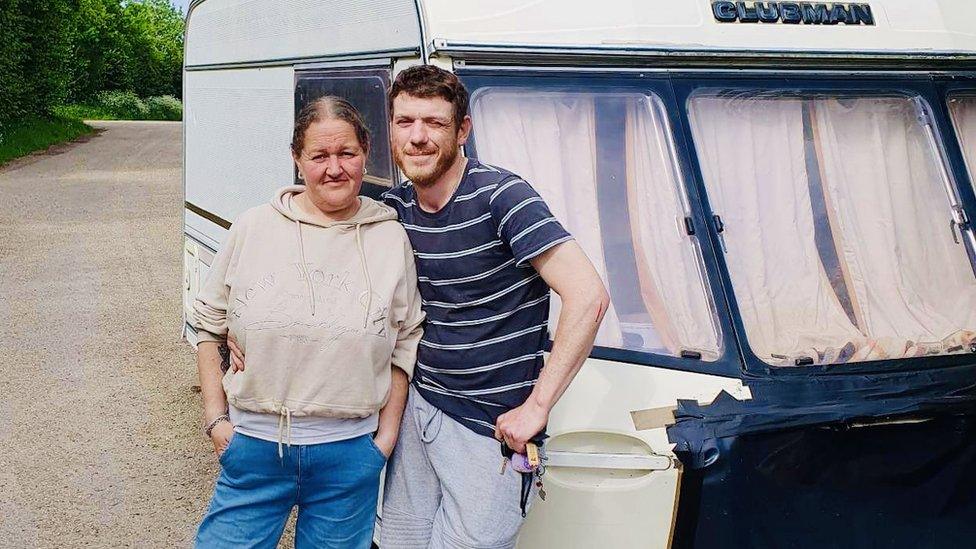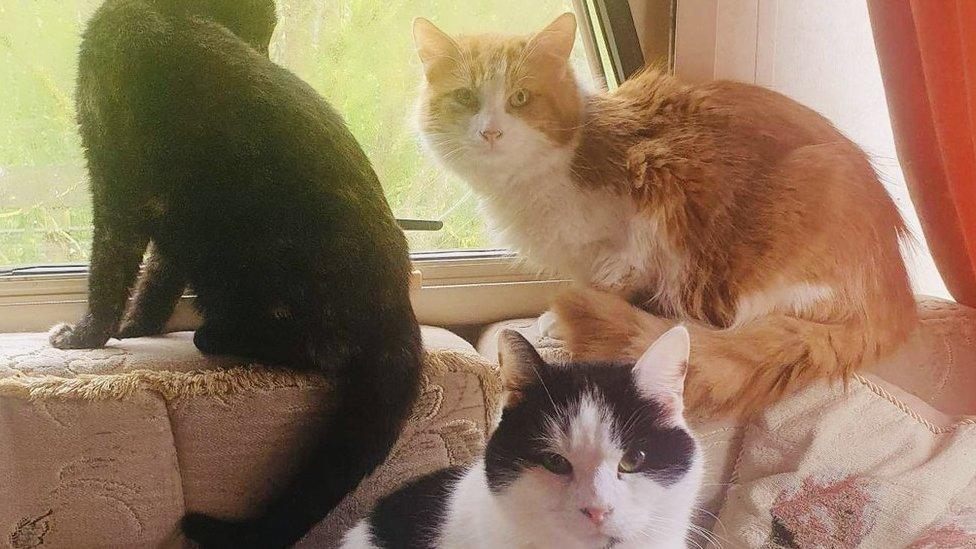Lincolnshire caravan couple 'at wits' end' over affordable home search
- Published

Wayne and his girlfriend have lived in several caravans in Lincolnshire after moving from Doncaster in November 2022
A homeless couple who have been living in caravans in Lincolnshire woodland for six months have said they are at their "wits' end" trying to get council help to find a house.
Wayne Cooper and his girlfriend left their home in Doncaster last year due to a dispute over a rental agreement.
But Mr Cooper, 37, said they had ended up living in caravans in the woods due to the high cost of renting a home.
Boston Council said Mr Cooper had rejected an offer of temporary housing.
Mr Cooper, who said he had mental health problems, moved from South Yorkshire to the Boston area with his partner in November 2022 to be near his immediate family.
He said that due to the cost of living crisis, they could not afford to pay the deposit and rents asked for by private landlords.
That was how they had found themselves living in caravans kindly given to them by local residents while seeking something more permanent, he said.
'A few good people'
Mr Cooper said since arriving in Lincolnshire, he and his girlfriend had been asked to move on several times.
The first caravan they stayed in was so cold and damp that strangers had given them a more watertight vehicle to sleep in through the coldest winter months, he said.
A villager close to the woodland spot where they were currently parked allowed them to shower in her home once a week as their caravan did not have any bathroom facilities, he said.
Mr Cooper said: "Frustrated is an understatement. But there are a few good people of Boston that chipped in to help us.
"Someone just dropped some cat food off for us. Someone has given us a smaller caravan so it is a lot drier and warmer because it holds the heat better."
Mr Cooper said the majority of the couple's money was going on paying to keep their car insured and on the road and "to pay back the people we have had to borrow from to survive the previous month".
He added that they managed to eat thanks to food banks and soup kitchens in the Boston area.

Mr Cooper says he "can't give up" on the three cats who live with him and his girlfriend in their caravan near Boston
A recent study found that in 2022 there was a 24% increase in rural homelessness, like that experienced by Mr Cooper and his partner, compared to 2021.
Liz Hopkins, chief executive of Centrepoint Outreach, a charity in Boston, said her organisation helped up to 30 homeless people a day with everything from providing hot showers to laundry to meals.
However, she said it did not offer outreach to rural parts of the county.
"In rural areas, there aren't the support services, so I think perhaps it becomes more apparent. If people are seen sleeping outside, there will be more awareness there is something unusual."
Ms Hopkins said it was impossible to put a number on rural homelessness as some people wanted to remain hidden.
Meanwhile, Brad Taylor, rural campaigns and policy manager for CPRE The Countryside Charity, said compared to urban areas, rural communities like those in Lincolnshire received "different levels of funding".
"Also, social housing and affordable housing is not something that is in place in rural communities," he said.
'Duty to assist'
Mr Cooper said he had presumed as he had close family connections with the Boston area, that would entitle him to housing help from the council.
Earlier this year, Boston Borough Council was awarded additional government funding amounting to almost £300,000 over two years to help people who were homeless and vulnerable.
In a statement, a spokesperson for the authority said it had accepted that Mr Cooper was homeless and in priority need.
He was therefore eligible for an offer of temporary accommodation, but Mr Cooper had rejected the council's initial offer because that would mean giving up his pet cats.
The spokesperson said: "The rejection brought to an end the council's duty to provide temporary accommodation, however the council still had a duty to provide advice and assistance to relieve homelessness."
As Mr Cooper did not have a "local connection" to Boston, he was therefore referred to Doncaster Council and that referral had been accepted, the spokesperson added.
"That council now has a duty to assist Mr Cooper. He would not have been referred if it was considered unsafe for him to reside in that council's area," they said.
A spokesperson from St Leger Homes, Doncaster Council's housing provider, said: "In any homelessness case an individual would approach a local authority for assistance.
"The local authority will assess the application which includes establishing a local connection to the area. If there is no local connection, they will be referred to an authority where a local connection exists.
"On receipt of the referral, the local authority will contact the household to undertake an assessment should the customer wish to proceed."
However, Mr Cooper and his girlfriend have vowed to remain in their caravan near Boston until they have found suitable housing for them and their pets.
"My cats are everything to me. I can't give up on them," he said.

Follow BBC East Yorkshire and Lincolnshire on Facebook, external, Twitter, external, and Instagram, external. Send your story ideas to yorkslincs.news@bbc.co.uk, external.